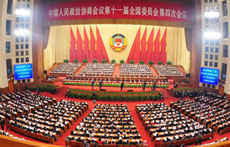China to increase flexibility of RMB exchange rate
(Xinhua)
Updated: 2011-03-14 11:32
BEIJING - Premier Wen Jiabao said Monday that China would continue to gradually increase the flexibility of its exchange rate while taking into consideration the pressure on enterprises and employment, which is important to social stability.
"The appreciation of the RMB must be gradual, because it affects jobs and raises pressure on enterprises and employment, and we must maintain the overall social stability," said Wen.
"We will continue to stick to the reform of the formation mechanism of the RMB exchange rate," Wen told a press conference after the conclusion of the annual parliamentary session.
The Chinese currency has appreciated 57.9 percent from the level of 1994. Since that year, China has conducted three major reforms on the RMB's exchange rate formation mechanism, he said.
"Our reforms have aimed to adopt a market-based, managed floating exchange rate regime which is tied to a basket of foreign currencies instead of pegging to the U.S. dollar," Wen said.
As for tackling the current inflation, ?Wen said, "The government has confidence to anchor inflation expectations."
The measures are three-fold, the premier said. The first is to boost production, especially ?agricultural produce supply. The second is to strengthen goods distribution, ?especially the weak link of agricultural goods distribution. The third is to use economic and legal means to manage the market.
In terms of the causes of inflation, Wen said China has both imported and structural inflation.
The current inflation is in part a global issue. Some countries have pursued a quantitative easing monetary policy, which has caused the fluctuations in exchange rates of major currencies and global commodity prices, Wen said.
"International grain price rose 15 percent in the past few months. Oil price jumped to over 100 U.S. dollars per barrel due to the volatile situation in western Asia and northern Africa," Wen said.
The structural inflation is due to rising labor cost and primary goods prices in China, Wen said.
The consumer price index (CPI), the main inflation gauge, went up 4.9 percent in both January and February, but there was a carryover effect of 3.7 percent in February, the premier said.
The inflation, including high consumer and property prices, affect the immediate interests of the people, therefore the government gives the top priority to tackling inflation, Wen said.



